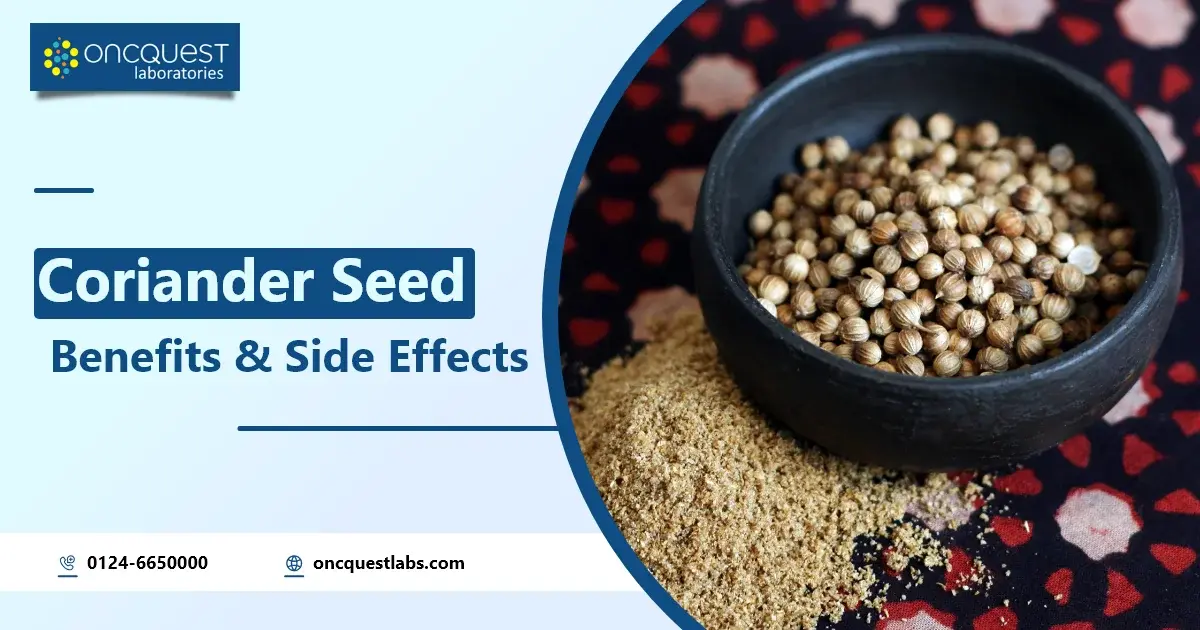Coriander seeds, the dried fruits of the coriander plant (Coriandrum sativum), are a popular spice with a rich history of use in culinary and medicinal contexts. Renowned for their aromatic, slightly citrusy flavor, these seeds have been a staple in kitchens worldwide, particularly in Indian, Middle Eastern, and Latin American cuisines. Beyond their culinary applications, coriander seeds are celebrated for their numerous health benefits and traditional medicinal uses.
This article delves into the comprehensive benefits of coriander seeds, exploring their impact on digestive health, detoxification, and overall well-being. Additionally, we will examine potential side effects and considerations to be aware of when incorporating coriander seeds into your diet. Whether you’re interested in enhancing your health with natural remedies or simply curious about this versatile spice’s properties, understanding its benefits and potential drawbacks is essential for making informed choices.
Contents
- 1 Nutritional Value of Coriander Seeds
- 2 Benefits of Coriander Seeds
- 3 Side Effects of Coriander Seeds
- 4 How to Consume Coriander Seeds
- 4.1 Whole Seeds
- 4.2 Ground Coriander
- 4.3 Coriander Tea
- 4.4 Coriander Seed Water
- 4.5 In Smoothies and Juices
- 4.6 Conclusion
- 4.7 FAQ
- 4.8 How should I store coriander seeds?
- 4.9 Can coriander seeds help with weight loss?
- 4.10 Are there any specific health conditions where I should avoid coriander seeds?
- 4.11 How can I make coriander seed tea?
- 4.12 Can coriander seeds interact with medications?
Nutritional Value of Coriander Seeds
Certainly! Here’s a table outlining the nutritional value of coriander seeds per 100 grams:
| Nutrient | Amount per 100g | Daily Value (DV) % |
| Calories | 298 kcal | – |
| Protein | 12.4 g | 25% |
| Total Fat | 17.8 g | 27% |
| – Saturated Fat | 0.8 g | 4% |
| – Monounsaturated Fat | 9.8 g | – |
| – Polyunsaturated Fat | 6.5 g | – |
| Cholesterol | 0 mg | 0% |
| Carbohydrates | 54.0 g | 18% |
| – Dietary Fiber | 41.0 g | 164% |
| – Sugars | 0.8 g | – |
| Vitamins | ||
| – Vitamin C | 0.0 mg | 0% |
| – Vitamin K | 0.0 µg | 0% |
| – Folate (Vitamin B9) | 7 µg | 2% |
| Minerals | ||
| – Calcium | 670 mg | 67% |
| – Iron | 16.3 mg | 91% |
| – Magnesium | 335 mg | 84% |
| – Phosphorus | 268 mg | 38% |
| – Potassium | 968 mg | 21% |
| – Zinc | 4.4 mg | 29% |
Benefits of Coriander Seeds
Certainly! Here’s a deep dive into the benefits of coriander seeds, exploring each aspect in detail:
Digestive Health
Coriander seeds are highly regarded for their positive impact on digestive health. They stimulate the production of digestive enzymes and bile, essential for breaking down food and absorbing nutrients efficiently. This stimulation helps in alleviating common digestive issues such as bloating, indigestion, and gas. The high fiber content in coriander seeds further supports digestive health by acting as a mild laxative. Fiber adds bulk to the stool and facilitates smoother bowel movements, reducing the risk of constipation and promoting regularity. Additionally, the soothing properties of coriander seeds can help calm an upset stomach and relieve discomfort.
Detoxification and Cleansing
Coriander seeds play a crucial role in the body’s natural detoxification processes. They contain compounds that support liver function, which is essential for processing and eliminating toxins from the body. Regular consumption of coriander seeds can enhance liver health and promote the removal of harmful substances, contributing to overall body detoxification. Furthermore, coriander seeds have a natural diuretic effect, which promotes the elimination of excess fluids and helps reduce water retention. This diuretic action supports kidney function, aids in maintaining fluid balance, and helps flush out toxins more efficiently.
Anti-Inflammatory and Antioxidant Properties
The anti-inflammatory properties of coriander seeds are attributed to their bioactive compounds, such as linalool and cineole. These compounds help reduce inflammation in the body, providing relief from conditions like arthritis, where chronic inflammation can cause joint pain and stiffness. By modulating inflammatory responses, coriander seeds can help manage symptoms and improve overall comfort. In addition to their anti-inflammatory effects, coriander seeds are rich in antioxidants, including flavonoids and phenolic compounds. These antioxidants combat oxidative stress by neutralizing free radicals, which are unstable molecules that can damage cells and contribute to chronic diseases. By protecting cells from oxidative damage, coriander seeds help reduce the risk of conditions like cardiovascular disease, cancer, and neurodegenerative disorders.
Supports Weight Loss
Coriander seeds can be a valuable addition to a weight management regimen. They help boost metabolism, which enhances the body’s ability to burn calories more efficiently. An increased metabolic rate can support weight loss efforts by improving energy expenditure. Additionally, coriander seeds may act as a natural appetite suppressant. By promoting satiety and reducing cravings, they can help manage overall calorie intake and support a balanced diet. Incorporating coriander seeds into meals may assist in controlling hunger and aiding in weight management.
Skin Health
The benefits of coriander seeds extend to skin health as well. Their detoxifying properties help cleanse the body of toxins, which can have a positive impact on skin clarity. By reducing the internal burden of toxins, coriander seeds may contribute to a clearer complexion and reduce the occurrence of acne and other skin issues. Moreover, coriander seeds possess anti-bacterial and anti-fungal properties, which can be beneficial in treating skin infections and maintaining healthy skin. These properties help combat harmful microorganisms and support overall skin health.
Blood Sugar Regulation
Coriander seeds have been found to support blood sugar regulation, making them a useful addition to the diet of individuals with diabetes or those at risk of developing diabetes. The seeds help stabilize blood sugar levels by enhancing insulin sensitivity and promoting more effective glucose uptake by cells. This regulation helps prevent spikes and crashes in blood sugar levels, contributing to better overall glycemic control and reducing the risk of diabetes-related complications.
Heart Health
Coriander seeds offer several benefits for heart health. They help lower levels of bad cholesterol (LDL) while increasing levels of good cholesterol (HDL). This balance supports a healthy lipid profile and reduces the risk of heart disease. Additionally, coriander seeds contribute to maintaining healthy blood pressure levels. Their diuretic effect and ability to support vascular health play a role in regulating blood pressure and promoting cardiovascular well-being.
Immune System Support
The immune-boosting properties of coriander seeds come from their high content of antioxidants and essential nutrients. These components help strengthen the immune system by protecting against infections and diseases. Regular consumption of coriander seeds can enhance overall immune function, providing a defense against common illnesses and supporting overall health.
Side Effects of Coriander Seeds
Coriander seeds are generally safe for most people when used in moderation, but they can cause side effects in some cases. Here’s a detailed look at the potential side effects:
Allergic Reactions
Some individuals may experience allergic reactions to coriander seeds. Symptoms can include skin rashes, itching, or swelling. In severe cases, there might be respiratory issues, such as difficulty breathing. If you have a known allergy to other plants in the Apiaceae family (such as carrots, celery, or parsley), you should be cautious.
Gastrointestinal Issues
Excessive consumption of coriander seeds can lead to gastrointestinal problems. The seeds have a mild laxative effect, and consuming them in large amounts might cause nausea, diarrhea, or stomach cramps. Moderation is key to avoiding these unpleasant symptoms.
Interactions with Medications
Coriander seeds can interact with certain medications. They may enhance the effects of anticoagulants and antiplatelet drugs, increasing the risk of bleeding due to their blood-thinning properties. Additionally, coriander seeds can influence blood sugar levels, which might affect diabetes medications and require careful monitoring and potential dosage adjustments.
Sensitivity in Specific Populations
Pregnant women should be cautious with high amounts of coriander seeds, as there is limited research on their safety during pregnancy. Similarly, individuals with gastrointestinal conditions such as irritable bowel syndrome (IBS) should use coriander seeds with caution, as they can exacerbate symptoms.
How to Consume Coriander Seeds
Coriander seeds can be consumed in various ways to incorporate their flavor and health benefits into your diet. Here’s how you can use them:
Whole Seeds
- As a Spice: Whole coriander seeds can be added to dishes like curries, stews, and soups. They release their flavor during cooking, providing a subtle, citrusy taste.
- In Pickles: Whole seeds are often used in pickling brines for vegetables and fruits, enhancing the flavor with their aromatic qualities.
Ground Coriander
- Spice Blends: Ground coriander is commonly used in spice blends such as garam masala, curry powder, and other seasoning mixes. It can be added to a variety of dishes to impart a warm, slightly sweet flavor.
- Baking: You can incorporate ground coriander into baked goods like bread or muffins for a unique flavor twist.
Coriander Tea
- Preparation: Boil 1-2 teaspoons of crushed coriander seeds in 1 cup of water for about 10 minutes. Strain the tea and drink it, either hot or cold. Coriander tea can aid digestion and provide a soothing effect.
- Variations: Add honey, lemon, or other herbs like mint to enhance the flavor and additional health benefits.
Coriander Seed Water
- Preparation: Soak 1-2 teaspoons of coriander seeds in a glass of water overnight. In the morning, strain the seeds and drink the infused water on an empty stomach. This is believed to help with digestion, detoxification, and blood sugar regulation.
In Smoothies and Juices
- Blend: Add a small amount of ground coriander seeds to smoothies or fresh juices. This adds a hint of spice and can enhance the nutritional profile of your beverage.
Conclusion
Coriander seeds are a versatile and beneficial addition to your diet, offering numerous health benefits such as supporting digestive health, aiding in detoxification, and providing anti-inflammatory and antioxidant properties. They can be consumed in various forms, including whole seeds, ground powder, tea, or infused water, making them easy to incorporate into daily meals and beverages. However, it’s important to use coriander seeds in moderation and be mindful of potential side effects, such as allergic reactions or interactions with medications. As with any dietary supplement or change, consulting with a healthcare provider is recommended, especially if you have underlying health conditions or are on medication.
FAQ
How should I store coriander seeds?
Store whole coriander seeds in an airtight container in a cool, dry place away from direct sunlight. Ground coriander should be kept in a sealed container and used within a few months for best freshness.
Can coriander seeds help with weight loss?
Coriander seeds can support weight loss efforts by boosting metabolism and acting as a natural appetite suppressant. However, they should be used as part of a balanced diet and healthy lifestyle.
Are there any specific health conditions where I should avoid coriander seeds?
Individuals with allergies to other Apiaceae family plants, gastrointestinal disorders, or those who are pregnant should use coriander seeds with caution. Consult with a healthcare provider if you have specific health concerns.
How can I make coriander seed tea?
To make coriander seed tea, boil 1-2 teaspoons of crushed coriander seeds in 1 cup of water for about 10 minutes. Strain the tea and drink it, either hot or cold.
Can coriander seeds interact with medications?
Yes, coriander seeds can interact with certain medications, such as anticoagulants and diabetes medications. They may enhance the effects of blood-thinning medications and influence blood sugar levels, so it’s important to monitor and consult with a healthcare provider.





